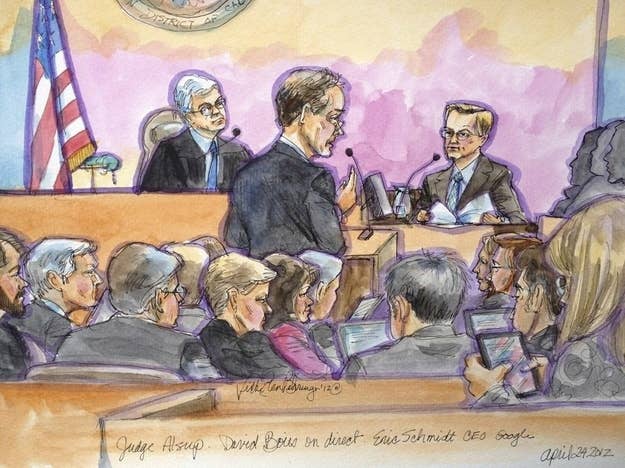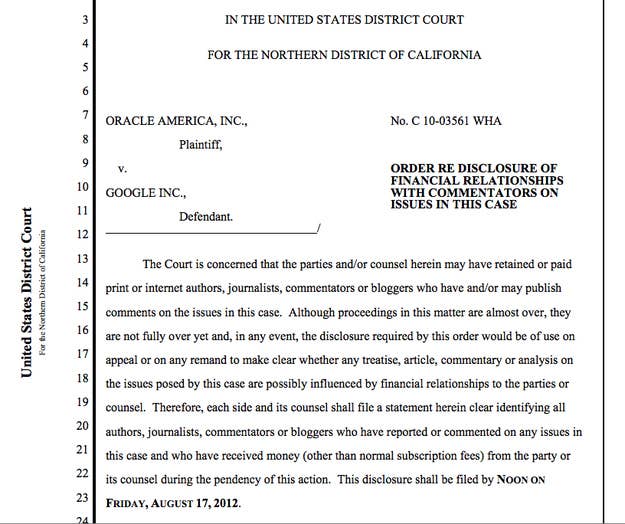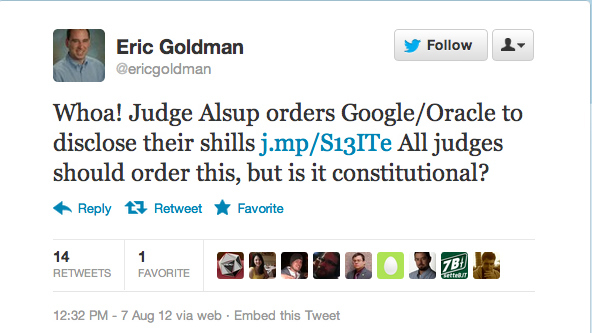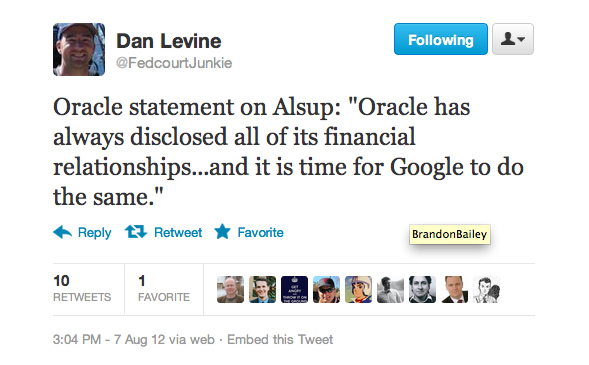
While most legal eyes were turned to San Jose, where the Apple/Samsung smackdown chugs along, San Francisco-based Judge Alsup came up with an unexpected demand in the almost-finished Oracle v. Google infringement suit, in which Oracle claims that Android operating system unfairly appropriated Java code.
In what experts say is an unprecedented move, Google and Oracle must reveal any authors, bloggers, commentators or journalists that they've paid who have reported or commented on the case. This order sent shockwaves around both the legal world and the tech blogosphere. "I've never seen any order like this before," said Eric Goldman, law professor at Santa Clara University, "We're in unchartered territory here."

Here is the order (emphasis added):
The Court is concerned that the parties and/or counsel herein may have retained or paid print or internet authors, journalists, commentators or bloggers who have and/or may publish comments on the issues in this case. Although proceedings in this matter are almost over, they are not fully over yet and, in any event, the disclosure required by this order would be of use on appeal or on any remand to make clear whether any treatise, article, commentary or analysis on the issues posed by this case are possibly influenced by financial relationships to the parties or counsel. Therefore, each side and its counsel shall file a statement herein clear identifying all authors, journalists, commentators or bloggers who have reported or commented on any issues in this case and who have received money (other than normal subscription fees) from the party or its counsel during the pendency of this action.
On Twitter, lawyers already began debating (in 140 characters) the legality of such a thing.

From the start, Alsup has been a different kind of trial judge: the programming kind. During the spring arguments, he revealed that he had learned how to code to prepare for trial, and regularly skewered the lawyers. In one exchange, following an argument made by superstar litigator David Boies that Google copied nine lines of code to to speed up development of Android, Alsup said, "I have done, and still do, a significant amount of programming in other languages...The idea that someone would copy that when they could do it themselves just as fast, it was an accident. There's no way you could say that was speeding them along to the marketplace. You're one of the best lawyers in America — how could you even make that kind of argument?"
In a phone conversation, law professor Eric Goldman said that he was surprised by this order on a number of grounds. First, it was issued very late in the trial — normally, the concern with biased press would be around a jury being tainted by unfair media coverage, but that isn't the case here. Also, the sheer scope of the order — there are thousands of vendors and independent contracts who have done business with Google and Oracle since the trial got started in April — makes it a big deal.
"I'm concerned by the false positives. The literal order is about people who have blogged about the case and gotten money from Google — well, I've blogged the case and I do get Google AdSense money. I meet the literal terms of the order," Goldman said. Additionally, he could think of two situations where the order might conflict with one's constitutional right to privacy: an attorney/client privilege (lots of lawyers are blogging this case) and a journalistic privilege, if someone paid Google or Oracle as a source for information.
And those are just the first two possibilities that popped into Goldman's head. "Frankly, I'm not even sure I can think of all the different types of people and the reasons they would be affected by this order," he said.
Another aspect to this order, raised by several commenters already, is the notion that Alsup is fishing for a specific person or entity. One person who has already been outed is patent blogger Florian Mueller, who disclosed that he has financial ties to Oracle while blogging critically of Google. (In a tweet, Mueller said he favors "proactively" revealing ties.) Goldman wouldn't comment on rumors but he did say it was striking that Alsup used the word "treatise" in the list of writings he wanted disclosure on. "It's a technical legal word that means authoritative restatements of the law written by expert commentators. In copyright law, there are a couple of leading treatists," he said, naming two legal thinkers who have written widely-respected works on the topic: David Nimmer, a UCLA lecturer who is also a private lawyer and William Patry, who works for Google. Goldman said that he'd have to check to see if Patry or Nimmer came up in this trial, but if so, Alsup might be looking to make clear their financial ties to the big companies.
So what happens now? Alsup has given the companies until next Friday to make their disclosure, but Goldman said there'd likely be pushback from Google and Oracle, not to mention those who feel that their privacy might be compromised. When I told Goldman that my first reaction was to applaud Alsup's desire to out shills, he paused. The problem of biased think tanks and sketchy lobbying groups is widespread in tech, as other industries: a recent two-part San Jose Mercury News story named names of such paid advocates in the Google and Microsoft anti-trust actions. "Disclosures of conflict is a very tricky topic. We don't have enough disclosure on these conflicts," he said. "I think the judge's impulses are commendable. I don't think he can do what he did, though."
Update, 4:10 p.m. Oracle has given a comment on Judge Alsup's order:

Here is the full statement from spokeswoman Deborah Hellinger:
"Oracle has always disclosed all of its financial relationships in this
matter, and it is time for Google to do the same. We read this order to
also include indirect payments to entities who, in turn, made comments on
behalf of Google."
This adds some credence to the notion that Alsup is looking for something in particular with this strange, broad order — and that Google is on the receiving end of the pointed request. But what, or who, remains a mystery. "I've not seen anything like this. More than anything, I'm frankly curious whether there's something behind this," Julie Samuels, a lawyer at the Electronic Frontier Foundation, "For Judge Alsup to issue such a broad order, once the trial is done, it means that there's something serious he's concerned about, or the court is out of place."
Regardless of the impetus for the order, Samuels shared Goldman's concern that it was imprecise to the point of overstepping the court's bounds. "You can't control what's in the public opinion," she said. Google has not yet released a comment.
Update, 8:20 a.m. Google says it will also comply.
